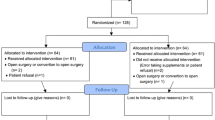Abstract
Background
We conducted a prospective and case-controlled study to evaluate the impact of supplement of alanyl-glutamine dipeptide (Gln) in parenteral nutrition on perioperative immune and nutritional changes and clinical outcomes for patients undergoing gastrointestinal (GI) operations.
Materials and methods
During 2006, 70 patients undergoing GI surgeries were allocated equally into two groups. One group received regular parenteral nutrition and the other received the same formulation and supplemented with the Gln; the two groups were isonitrogenous. The infusion was started from 1 day before operation to the sixth day after operation for 7 days. Blood samples were collected on the morning of the day before the operation and on the morning 6 days after the operation and analyzed for immune and nutrition parameters.
Results
There were no differences between the two groups in terms of clinical characteristics, operative procedures, biochemistry, nutritional status, and immune status preoperatively. After GI surgery, significant reduction in nutritional and immune parameters were observed in both groups, demonstrated by significant difference of albumin, C-reactive protein (CRP), lymphocyte count, T cell, and CD8 cell. The length of hospital stay is slightly longer in the control group patients, but not to statistical significance (16.3 ± 21.3 versus 12.2 ± 6.8 days, p = 0.299). In terms of morbidity, there was no difference between the two groups, but two patients in the control group had wound infection; none was noted in the Gln group (p = 1.0). No surgical mortality was noted in this study.
Conclusions
Perioperative parenteral nutrition supplemented with Gln is beneficial for patients undergoing GI surgery. Gln supplementation significantly attenuated postoperative inflammation and ameliorated postoperative immunodepression as well as nutritional depression in GI surgery.






Similar content being viewed by others
References
Kinney JM, Elwyn DH (1983) Protein metabolism and injury. Ann Rev Nutr 3:433–466
Furst P (1983) Intracellular muscle free amino acids—their measurement and function. Proc Nutr Soc 42:451–462
Bergstrom J, Furust P, Noree L-O, Vinnars E (1974) Intracellular free amino acid concentration in human muscle tissue. J Appl Physiol 36:693–697
Smith PJ, Wilmore DW (1990) Glutamine nutrition and requirements. J Parenter Enteral Nutr 14:94S–99S
Hammarqvist F, Wernerman J, Von der Decken A, Vinnars E (1990) Alanyl-glutamine counteracts the depletion of free glutamine and the postoperative decline in protein synthesis in skeletal muscle. Ann Surg 212:637–644
Karner J, Roth E (1990) Alanylglutamine infusion to patients with acute pancreatitis. Clin Nutr 9:43–45
Stehle P, Zander J, Mertes N et al (1989) Effect of parenteral glutamine peptide supplements on muscle glutamine loss and nitrogen balance after major operation. Lancet 1:231–233
Souba WW (1991) Glutamine: a key substrate for the splanchnic bed. Annu Rev Nutr 11:285–308
Souba WW, Klimberg VS, Plumley DA et al (1990) The role of glutamine in maintaining a healthy gut and supporting the metabolic response to injury and infection. J Surg Res 48:383–391
Angele MK, Faist E (2002) Clinical review: immunodepression in the surgical patient and increased susceptibility to infection. Crit Care 6:298–305
Amersfoort ESV, Van Berkel TJC, Kuiper J (2003) Receptors, mediators, and mechanisms involved in bacterial sepsis and septic shock. Clin Microbiol Rev 16:379–414
Lin MT, Kung SP, Yeh SL et al (2002) The effect of glutamine-supplemented total parenteral nutrition on nitrogen economy depends on severity of diseases in surgical patients. Clin Nutr 21:213–218
Weimann A, Braga M, Harsanyi L et al (2006) ESPEN guidelines on enteral nutrition: surgery including organ transplantation. Clin Nutr 25:224–244
Clotilde FO, Roberto AP, Alejandro GO, Humberto AM, Carlos CP, Gabino CG, Luis MBZ (2004) l-Alanyl-l-glutamine-supplemented parenteral nutrition improves infectious morbidity in secondary peritonitis. Clin Nutr 23:13–21
Song JX, Tu XH, Wang L, Li CJ (2004) Glutamine dipeptide-supplemented parenteral nutrition in patients with colorectal cancer. Clin Nutr 1:49–53
Jiang ZM, Jiang H, Furst P (2004) The impact of glutamine dipeptides on outcome of surgical patients: systematic review of randomized controlled trials from Europe and Asia. Clin Nutr 1:17–23
Melis GC, ter Wengel N, Boelens PG, van Leeuwen PA (2004) Glutamine: recent developments in research on the clinical significance of glutamine. Curr Opin Clin Nutr Metab Care 7:59–70
Novak F, Heyland DK, Avenell A, Drover JW, Su X (2002) Glutamine supplementation in serious illness: a systematic review of the evidence. Crit Care Med 30:2022–2029
Dhar A, Kujath S, Van-Way CW (2003) Glutamine administration during total parenteral nutrition protects liver adenosine nucleotides during and after subsequent hemorrhagic shock. J Parenter Enteral Nutr 27:246–251
Fuentes Orozco C, Anaya Prado R, Gonzalez Ojeda A et al (2004) l-alanyl-l-glutamine-supplemented parenteral nutrition improves infectious morbidity in secondary peritonitis. Clin Nutr 23:13–21
Acknowledgment
This study appreciates Fresenius Kabi, (Taiwan) Co., Ltd for the financial support of the analysis of the immune function.
Author information
Authors and Affiliations
Corresponding author
Rights and permissions
About this article
Cite this article
Yeh, CN., Lee, HL., Liu, YY. et al. The role of parenteral glutamine supplement for surgical patient perioperatively: result of a single center, prospective and controlled study. Langenbecks Arch Surg 393, 849–855 (2008). https://doi.org/10.1007/s00423-008-0405-4
Received:
Accepted:
Published:
Issue Date:
DOI: https://doi.org/10.1007/s00423-008-0405-4




